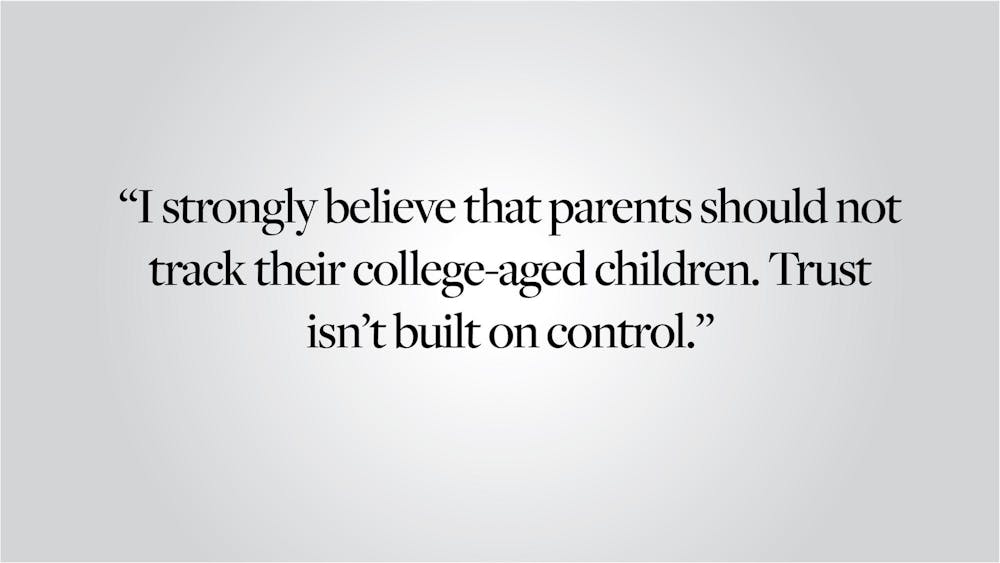Two weeks ago, I was sitting at Saloniki Greek in Harvard Square visiting two friends from high school. I looked at my phone and saw a bombardment of anxious text messages from my parents: “Go home.” “It’s already 8:30” “Safety should be your first priority.” “Is it worth throwing your future away because you got attacked on the subway late at night?”
When I went to college, my parents and I had (reluctantly) agreed that I would continue to share my location with them, though it could not and would not be used as a tool to control my whereabouts. In other words, no questions asked.
As a child of Bangladeshi immigrants, I’ve always been used to some level of parental overreach, but this incident felt especially egregious. It had also not been the first breach of our rules of engagement.
I’m 19 years old. I live 700 miles from home. I’m a sophomore at Brown. And I’ve never given my parents a reason to distrust me or believe I have poor judgment. So, sitting there in Harvard Square, I decided I’d had enough. I stopped sharing my location with my parents, prompting a fierce and ongoing battle that has led to threats of withheld tuition and being blocked by my father — all, of course, in the name of protecting my safety.
But I am determined to win the war.
I strongly believe that parents should not track their college-aged children, for one simple reason: Trust isn’t built on control. Apps like Find My and Life 360 can be used productively, but when abused as a substitute for proper communication they can actually harm the parent-child relationship. These apps create a facade of control during young adulthood when, for perhaps the first time, parents are powerless to protect their children from afar.
In her New York Times op-ed, psychologist Lisa Damour worries “that location tracking can confuse the question of who is mainly responsible for the safety of the roaming adolescent — the parent or the teenager?” Sonia Livingstone, a professor at the London School of Economics, concludes that there is “zero evidence that any of these apps keep children safer” instead arguing that "the most important thing for development is that the child learns to trust the parent and the parents the child.”
It’s time to let go. A large part of attending a residential university is learning how to be an independent adult. While parents often can, through a combination of coercion and location-tracking, force their adult children to go to class or make curfew, they cannot force character development and maturity. Calculated danger, and yes, failure is a part of growing up.
I asked some of my friends about their thoughts on parental surveillance and the results are unambiguous. One friend, although she agreed to be tracked, says, “I don’t love it; I feel like I’m my own person, and they don’t need to know where I am all the time.” Another, who refused to give in to his parent's demands, said it was “because I wanted freedom, even if that’s an illusion.” Besides, he adds, “I figured my mom would be checking often and texting me about it and I wanted to avoid that at all costs.” And a third, whose mom is alerted every time he leaves his building, took issue with the potential for never-ending surveillance: “I think it’s fine for your parents to have your location for safety reasons,” he said, “but once they start using it to constantly know where you are and restrict your freedom for activities that are safe, then it’s a problem.”
These apps raise delicate questions about children’s right to privacy in our digital age, as well as the proper balance of power in the relationship between parents and their children. But the question of parental surveillance is not black and white — nor should it be. It is only through dialogue and compromise that children and their parents can build understanding with one another as they inevitably navigate all kinds of conflict.
On my part, I have brokered a peace deal with my mom to share my location with my aunt in case of emergency and to call my parents more. While not a perfect solution, I hope this new status quo will actually strengthen our relationship with one another — perhaps it will encourage them to ask me more questions about my life. After all, what excitement is there in sending your kids to college if you need not ask, “What did you do today, and how was your day?”
For generations, kids have grown up, gone to college, and gone on to be successful adults — all without being monitored. I too will survive. So sorry, Mom and Dad, but no, I will not be sharing my location with you.
‘Tas Rahman ’26 can be reached at tasawwar_rahman@brown.edu. Please send responses to this opinion to letters@browndailyherald.com and other op-eds to opinions@browndailyherald.com.

Tas Rahman is an opinions editor at the Brown Daily Herald writing about issues in higher education. When he's not coding or studying biochemistry, you can find him hiking and enjoying the great outdoors.





